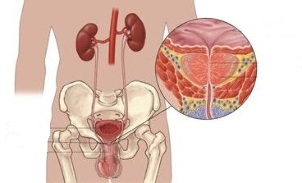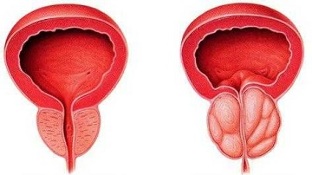The prostate, or as it is otherwise known as the prostate, is a fairly vulnerable male organ that is exposed to various urological diseases, especially prostatitis. And, despite the spread of the disease, treating chronic prostatitis is quite a difficult task.
Varieties of prostatitis and the reasons for their development
Prostatitis is a disease of the prostate, which is accompanied by an inflammatory process of the tissues. Prostatitis is classified according to the following data:
- acute bacterial prostatitis due to infectious agents;
- chronic bacterial (infectious) prostatitis;
- chronic abacterial (non-infectious) prostatitis;
- asymptomatic inflammatory prostatitis.
Chronic bacterial prostatitis - the nature of this species is not fully understood, despite many studies. This type occurs in the male body as a result of an infection of the prostate, which is possible for a number of reasons:

- severe hypothermia;
- having trouble emptying your bladder;
- unstable sex life (irregularity or lack of it);
- accompanying chronic diseases of the genitourinary system;
- leads an unhealthy lifestyle;
- lack of mobility.
Most often the disease proceeds without obvious symptoms and is only noticeable during periods of exacerbation, which are accompanied by the following signs:
- feeling of discomfort and incomplete emptying when urinating;
- decreased sexual activity;
- pain in the lower abdomen.
In addition, chronic prostatitis can provoke various diseases of the bladder, which progress to the stage of acute manifestation of the disease, and then treatment of the exacerbation of chronic prostatitis is already provided.
Chronic abacterial prostatitis - the incidence is 92-95% of all types of prostatitis. These data can be used to assess the prevalence. There are no age restrictions on this disease, so it affects men of all ages, but the maximum value falls on average after 30 years. The disease is diagnosed based on the following symptoms:
- the presence of painful discomfort (more than 3 months) in the pelvic organs;
- no signs of an infectious environment;
- increasing dysfunction of sexual activity and urination.
It is also possible to differentiate chronic calciferous prostatitis in urology, which in turn is a consequence of chronic prostatitis and is more problematic for older men.
Can chronic prostatitis be cured?
Every patient is tormented by the question of the effectiveness of the treatment of chronic prostatitis, since this disease not only brings with it many particular kinds of inconveniences, but also brings about psychological trauma for a man.
Given the different directions in the application of methods, we note that this appointment is made by a specialist on the basis of diagnostic measures. The urologist individually creates a comprehensive program for the treatment of prostatitis, which includes a whole range of therapeutic procedures. So a comprehensive conservative approach includes:
- drug treatment of chronic prostatitis;
- physiotherapy;
- manual therapy.
As already mentioned, a specialist selects an individual program, which will undergo adjustments from the general scheme, and each individual patient is a separate method of treatment for chronic prostatitis, calculated by his attending physician.
Effective treatment of chronic type prostatitis primarily includes the following additional tests:

- Consultation with a neuropsychiatrist, endocrinologist, cardiologist;
- Performing a computed or magnetic resonance imaging of the brain to study the functions of its performance and structure;
- hormonal condition research;
- Ultrasound of the genitourinary system.
How is chronic prostatitis treated if the patient does not see any symptoms? This case means that the patient is in remission or the disease is asymptomatic. The latter case, of course, involves an immediate visit to a specialist who will carry out all the necessary procedures. Treatment conditions for chronic prostatitis usually range from 2 weeks or more, they depend on the condition of the prostate and the degree of the disease.
For example, drugs used to treat chronic prostatitis require constant intake in men who are associated with the disease as a decrease in arterial blood flow in the penis. And in order to increase that blood flow and cause an erection, constant use of vasodilating drugs is required.
Treating chronic prostatitis at home
In case of exacerbation of chronic prostatitis, all recommendations described below are followed. This is bed rest for several days, exclusion from physical activity, refusal of alcohol. After getting rid of the exacerbation of chronic prostatitis, it is necessary to decide on your work and rest program for many years.
To avoid recurring exacerbations, the following basic guidelines must be followed at all times:
- Avoid hypothermia - first rule out sitting on cold floors, concrete curbs and stones, even in the warm season. Clothing should be loose and light enough, but suitable for the time of year. An excellent way to get rid of exacerbations of chronic prostatitis is to harden the body. In this case, you can use water and air bath hardening and be outdoors for at least 1-2 hours a day.
- It is very important to empty the bladder regularly, avoid overflow and prolonged urine retention ("do not tolerate", go to the toilet every 3-4 hours).
- If you have a sedentary job, every hour or two you need to take a 3-5 minute break and run around and warm up. If this is not possible, then you need to retract the anus at least 40-50 times in one approach and repeat these exercises 4-6 times a day.
- Regular moderate physical activity is one of the most important factors in preventing exacerbations of chronic prostatitis and clearing congestion in the prostate and pelvic organs. The minimum of such activities are daily morning exercises, during which 30-40 minutes of continuous running at a moderate or fast pace (that is, without stopping, going to the store, etc. ). In addition, you need a weekly excursion into nature with practicable work in the country for 2-3 hours of collecting berries, mushrooms or long weekend walks, visiting the pool or, in extreme cases, at home with home simulators (treadmill, rowing machine, Stepper).
- If possible, exclude trauma to the perineum (refusal to regular professional cycling, equestrian sports, motocross).
- Regular sexual activity is the most important factor in clearing congestion in the prostate. In addition, moderation is important here, the correspondence between sexual relationships and a man's sexual constitution. It is important to avoid prolonged and interrupted intercourse in order to have a permanent sexual partner.
- fight constipation.
- Complete refusal of alcohol consumption during exacerbation of prostatitis and maximum reduction in alcohol consumption during remission. This requires a complete rejection of beer and cheap wines.
- If possible, avoid work that involves constant nervous tension, frequent stressful situations, or learn to withstand stress through auto-training and meditation.
- Preventive visit to a urologist twice a year for clinical examination, TRUS, laboratory tests of urine and prostate secretions and after 40 years - and PSA. Implementing these simple measures will prevent possible exacerbation of chronic prostatitis and help strengthen the body and its defenses.
How can you cure chronic prostatitis with drugs?
The main causes of prostatitis are initially various infections and sexually transmitted viruses, which in turn affect the urethra and are detected in the tissue of the prostate. It should be noted that when diagnosing chronic bacterial prostatitis, treatment consists of several stages.
Treating bacterial prostatitis is one of the most difficult tasks in modern urology. Despite the advances in diagnosis and timely detection of the disease, complete cure can only be achieved in 30% of cases. The modern therapy for bacterial prostatitis consists of several stages and can clearly answer the question: "Is chronic prostatitis treated and how exactly? " The success also largely depends on the coordination of the patient-doctor chain. So, the main stages of treatment:
- pain relief - use of nonsteroidal anti-inflammatory drugs;
- reduce anxiety - take antidepressants;
- restoration of the urination process;
- local treatment - showering;
- physiotherapeutic treatment;
- targeted therapy - it is recommended to take drugs prescribed by a doctor for chronic bacterial prostatitis, as well as antibiotics.
- surgical treatment of chronic prostatitis - the use of this method is necessary in case of narrowing of the urethra and prostate abscesses.
It should be noted that treating chronic prostatitis with antibiotics is quite justified nowadays, but only after completing the full course, which lasts about 2 weeks on average. Upon completion, the doctor evaluates the results, and more often there is a positive trend. Antibiotics for chronic prostatitis are used because this disease is contagious and is mainly caused by pathogenic bacteria that absolutely require antibiotic therapy. The crucial point is the correct choice of the drug according to a clearly selected schedule of use by the attending physician.
It is particularly important to note that when taking medication for chronic prostatitis, you should strictly adhere to the timing of the prescribed treatment regimen and the frequency of doses.
It is worth remembering that there is no absolute cure for the treatment of chronic prostatitis, and maximum cure can only be achieved with a thorough diagnosis and compliance with all the prescriptions of a specialist. Self-medication is especially harmful for this disease because of its specificity and severity.
























